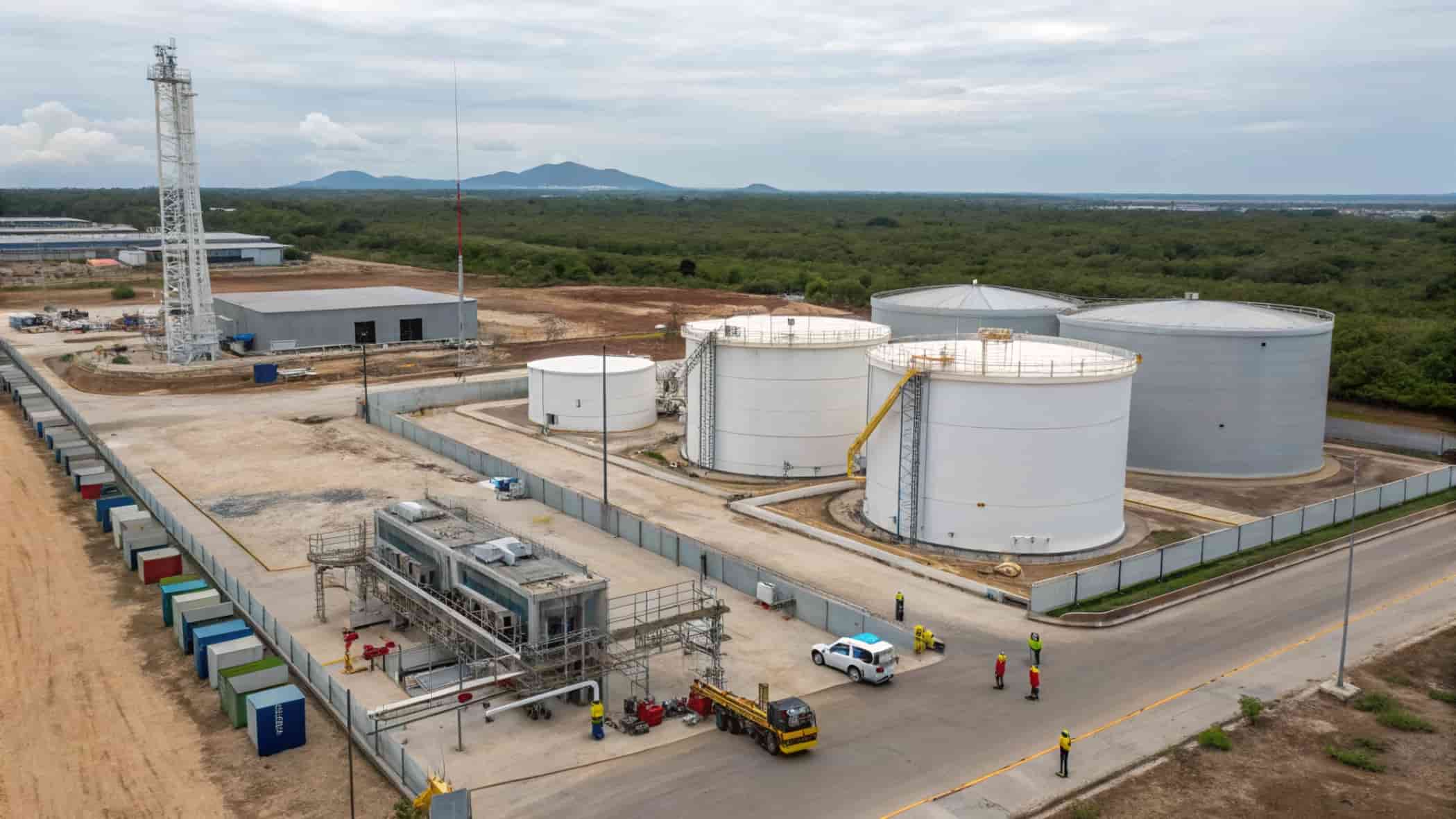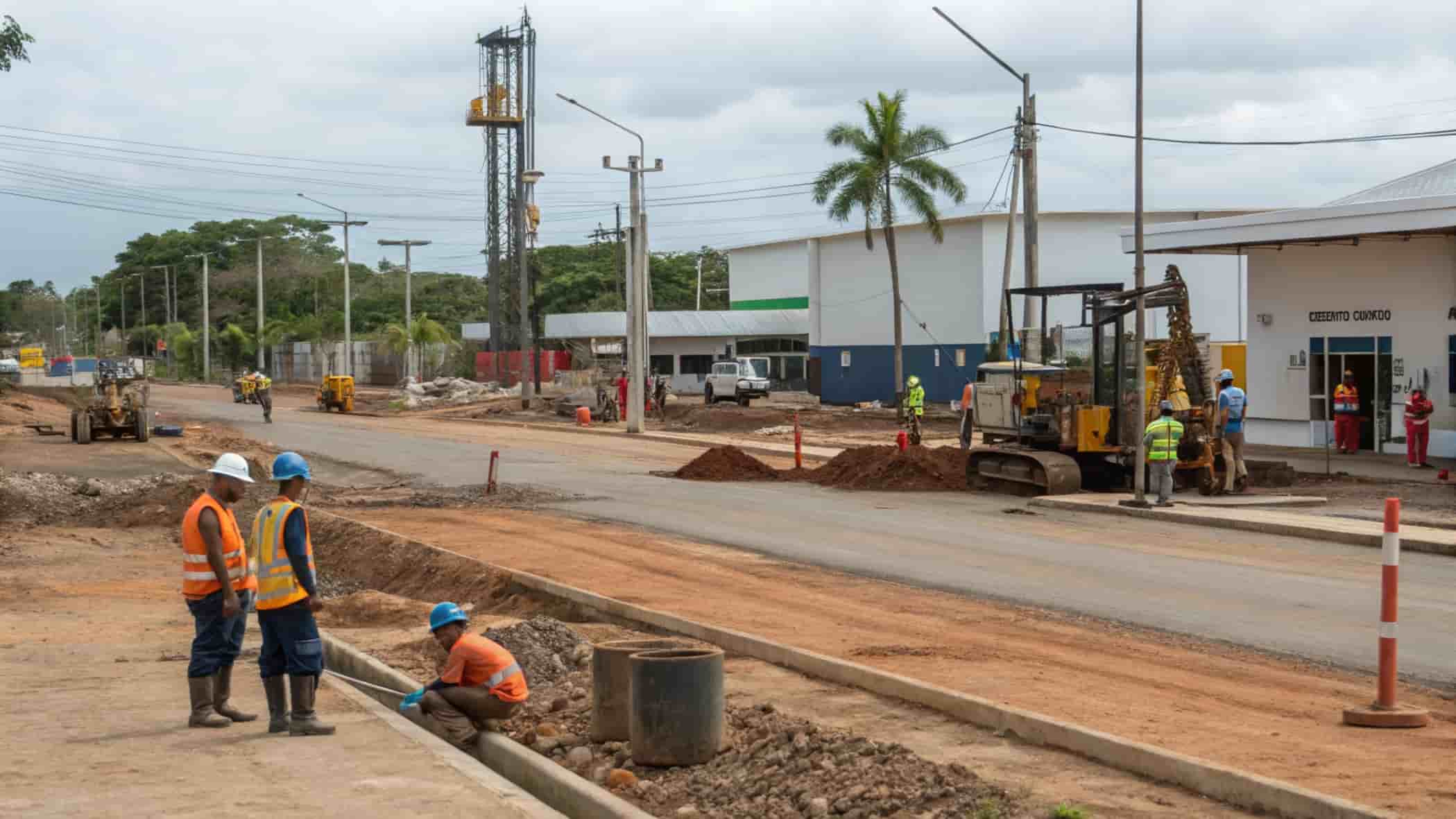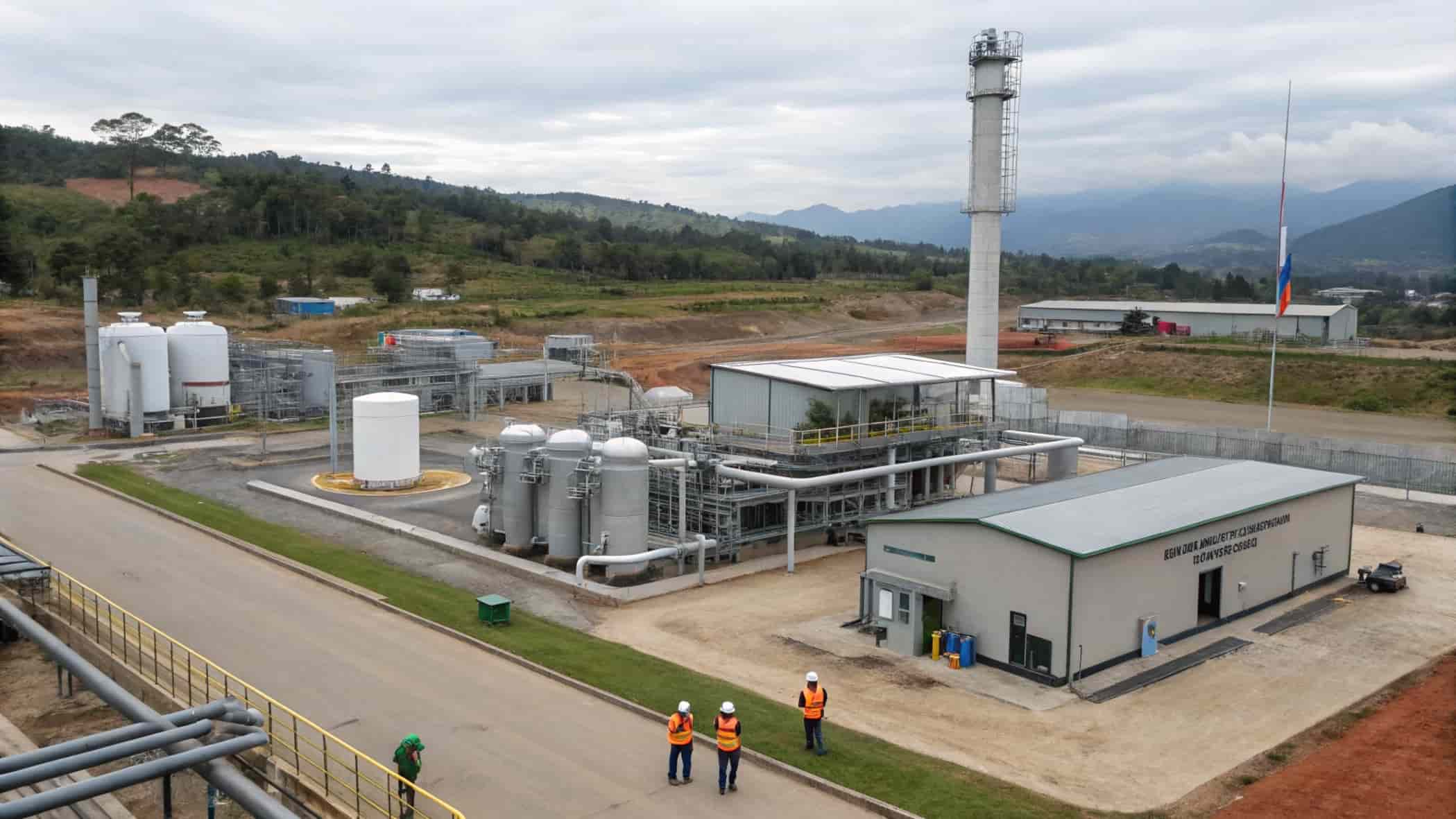Planta Fluidos De Perforación En Punata Camacho Edo. Zulia – Shocking Facts!
As the global appetite for natural resources continues to grow, ensuring that exploration technologies are efficient, sustainable, and safe has become more critical than ever. One of the key elements in petroleum and mineral drilling operations is the use of drilling fluids essential for cooling equipment, maintaining pressure stability, transporting waste, and enhancing overall drilling performance.
At the center of these operations in South America is the planta fluidos de perforación en Punata Camacho Edo. Zulia, a cutting-edge facility that significantly contributes to the energy infrastructure of both Venezuela and Bolivia.
Stay tuned with us, we examine the core functions of this facility, its environmental strategies, economic contributions, and its strategic importance to regional development. We also explore how it positions itself as a model for future exploration technologies that prioritize innovation and responsibility.
What Is The Planta Fluidos De Perforación En Punata Camacho Edo. Zulia?
The planta fluidos de perforación en Punata Camacho Edo. Zulia refers to a highly specialized industrial facility dedicated to the development, management, and delivery of drilling fluids in the oil and mineral exploration sectors. Located in the resource-rich state of Zulia, Venezuela, this plant plays a pivotal role in streamlining extraction processes while emphasizing sustainability, operational efficiency, and regional economic impact.

This facility represents a fusion of engineering excellence and environmental consciousness. With its dedicated research divisions and operational units, it stands out as a model for other similar installations across Latin America. It not only supplies high-quality drilling fluids but also innovates constantly to adapt to the region’s complex geology and regulatory environment.
Why Are Drilling Fluids So Essential In Oil & Mineral Exploration?
Drilling fluids, also known as “mud,” are more than just supportive tools in the extraction process. They are critical for:
- Cooling and lubricating drill bits to reduce wear and prevent overheating.
- Removing rock cuttings from boreholes.
- Stabilizing borehole walls and preventing collapse.
- Balancing pressure within geological formations.
- Preventing blowouts, ensuring safety for workers and surrounding ecosystems.
Beyond these essential functions, drilling fluids also act as a medium for carrying information. By analyzing the fluid returns, engineers can gain insights into underground formations, potential hazards, and hydrocarbon presence. Therefore, they serve as both a functional and diagnostic component of any drilling operation.
The Strategic Importance Of Punata Camacho In Edo. Zulia – Dont Miss Out!
The location of the plant is no coincidence. Punata Camacho is strategically positioned in Zulia, a state historically significant in Venezuela’s oil development. Its geographic and logistical advantages make it a natural hub for supporting drilling activities in the region.
Punata Camacho offers proximity to major oil fields, access to transportation infrastructure such as roads and rail, and is surrounded by a skilled labor pool. Its location reduces fluid transportation time and costs, allowing for faster service delivery to nearby rigs. Moreover, the geopolitical stability of the region makes it favorable for long-term industrial investments.
Core Functions Of The Planta Fluidos De Perforación – Need To Know!
The planta fluidos de perforación en Punata Camacho Edo. Zulia is designed to serve multiple critical roles in the drilling industry. Its core functions ensure the production, quality, and sustainability of drilling fluids for a variety of geological conditions.
Custom Formulation of Drilling Fluids:
- Develops drilling fluid recipes tailored to specific soil and rock conditions.
- Offers various types including water-based, oil-based, and synthetic muds.
- Adjusts viscosity, pH, and density to suit depth, temperature, and pressure requirements.
On-Site Laboratory Testing and Quality Control:
- Ensures all drilling fluids meet operational, safety, and environmental standards.
- Conducts continuous testing for parameters such as gel strength, fluid loss, solids content, and rheology.
- Guarantees compatibility with formation chemistry and pressure conditions.
Recycling and Waste Fluid Management:
- Implements closed-loop systems to recycle drilling fluids for reuse.
- Uses solid control equipment like shale shakers and centrifuges to separate contaminants.
- Minimizes waste discharge and reduces water consumption during operations.
Inventory and Chemical Management:
- Maintains a stable inventory of essential additives and base fluids.
- Uses chemical storage and mixing systems with real-time tracking to prevent losses and ensure safety.
- Optimizes delivery schedules to drilling sites for uninterrupted operations.
Technical Support and On-Site Services:
- Provides field engineers and fluid specialists to assist at active drill sites.
- Offers troubleshooting, real-time fluid monitoring, and emergency response for downhole issues.
- Delivers technical documentation and compliance reports for regulatory needs.
Training and Workforce Development:
- Trains operators, technicians, and engineers on best practices in drilling fluid technology.
- Offers certification programs in fluid handling, testing, and environmental safety.
- Collaborates with academic institutions for internships and research initiatives.
Sustainability and Environmental Integration:
- Integrates eco-friendly additives and biodegradable agents into its fluid formulations.
- Employs emission monitoring systems to track and reduce environmental impact.
- Participates in environmental rehabilitation and water resource management efforts.
Innovation and Research & Development (R&D):
- Collaborates with national and international partners for innovation exchange.
- Invests in R&D to develop next-generation fluid technologies.
- Tests nanotechnology-based additives, thermal-resistant formulations, and low-toxicity systems.
What Are The Key Technologies At The Plant?
The planta fluidos de perforación en Punata Camacho Edo. Zulia leverages advanced technologies to enhance precision, safety, and efficiency in fluid production. Automated mixing systems ensure consistent formulation of complex drilling fluids, while IoT-enabled sensors monitor real-time parameters like viscosity, density, and temperature. The facility also uses high-speed centrifuges and shale shakers for effective solids control and fluid recycling.
AI-driven analytics help predict performance issues and optimize chemical usage. Additionally, digital inventory systems streamline supply chain management, and laboratory equipment supports rapid quality testing for various field conditions. These innovations make the plant a model of modern fluid engineering.
How Does The Plant Demonstrate Environmental Responsibility?
The planta fluidos de perforación en Punata Camacho Edo. Zulia integrates environmental responsibility into every stage of its operations. From fluid formulation to waste disposal, the plant is committed to minimizing its ecological footprint through innovation and strict regulatory compliance.
- Use of Non-Toxic Additives: The plant prioritizes biodegradable and environmentally safe chemical components to reduce soil and water contamination risks.
- Water Recycling Systems: Advanced treatment facilities allow the reuse of water in fluid processing, significantly lowering overall water consumption.
- Waste Management Protocols: All solid and liquid wastes are treated, neutralized, or repurposed in line with environmental regulations to avoid harmful disposal.
- Continuous Environmental Monitoring: Real-time sensors and audits are used to detect emissions, leaks, or any other ecological threats near the facility.
- Emission Reduction Strategies: Equipment is optimized to minimize greenhouse gas emissions, including transitioning to low-energy systems and renewable energy integration.
- Community and Ecosystem Protection Programs: The plant collaborates with local communities and NGOs to support reforestation, wildlife preservation, and education on environmental care.
What Is The Economic And Community Impact Of The Plant In Edo. Zulia?
The planta fluidos de perforación en Punata Camacho Edo. Zulia plays a crucial role in strengthening both the local and regional economy. It provides stable employment opportunities for engineers, technicians, and laborers, while also supporting indirect jobs in transportation, catering, maintenance, and security. The plant’s presence has sparked demand for local suppliers and services, boosting small businesses and increasing household incomes.

Additionally, infrastructure developments such as improved roads, utilities, and training centers have enhanced the quality of life in nearby communities. Through scholarships, vocational training, and community outreach, the facility also invests in human capital and long-term social upliftment. As a result, the plant is not just a hub for industrial activity but a key driver of inclusive growth in Edo. Zulia.
How Does The Plant Ensure Compliance With National And International Standards?
Digital Recordkeeping and Traceability:
The plant uses digital tools to document every batch of fluid produced, including its ingredients, quality checks, and destination. This traceability ensures that in the event of an audit or incident, all information is easily accessible and verifiable. It also helps demonstrate full regulatory transparency.
ISO and API Certifications:
The plant holds certifications like ISO 9001 for quality management and API (American Petroleum Institute) standards for drilling operations. These certifications reflect its commitment to maintaining high-quality processes across the board. Regular renewals ensure compliance with evolving global benchmarks.
Routine Government Audits and Inspections:
Local environmental and industrial agencies frequently audit the plant’s activities. These inspections cover waste management, fluid composition, worker safety, and emissions. Passing these audits is key to retaining operational licenses and public trust.
Environmental Impact Assessments (EIAs):
Before any expansion or operational shift, detailed EIAs are conducted. These assessments measure the potential ecological effects of the plant’s actions. The reports guide adjustments in operations to ensure minimal environmental disruption.
Health, Safety, and Environmental (HSE) Policies:
The facility enforces rigorous HSE protocols based on international models. These include protective equipment requirements, emergency response plans, and accident prevention training. Compliance with HSE standards ensures workforce well-being and operational integrity.
Training and Certification of Staff:
Employees are required to complete training aligned with legal and industrial compliance frameworks. This includes modules on chemical handling, spill response, and safety drills. Certification helps ensure all staff members understand and apply regulatory best practices.
What Collaborations And Industry Partnerships Strengthen The Plant’s Operations?
The planta fluidos de perforación en Punata Camacho Edo. Zulia benefits greatly from its collaborations with both local and international partners. It works closely with national oil and gas companies to ensure steady demand and joint development of drilling solutions. The plant also partners with global chemical suppliers to access high-quality, eco-friendly additives.
Research agreements with universities and technical institutes help drive innovation and workforce training. Environmental NGOs are involved to monitor and improve sustainability efforts. These partnerships not only improve operations but also enhance the plant’s reputation and long-term success.
What Are The Main Challenges Faced By The Facility?
Despite its advanced infrastructure and strong regional presence, the planta fluidos de perforación en Punata Camacho Edo. Zulia faces a variety of operational and strategic challenges. These issues range from environmental concerns to market volatility, requiring constant adaptation and forward planning.
- Fluctuating Global Commodity Prices: Market instability affects drilling activity, reducing fluid demand and revenue. The plant must balance production to avoid overstocking. Accurate forecasting becomes essential to minimize losses.
- Stringent Environmental Regulations: Tougher laws demand constant upgrades in operations and processes. Compliance requires time, investment, and training. Non-compliance risks fines or operational delays.
- Supply Chain Disruptions: Delays in importing key materials can interrupt production schedules. Political or logistical issues worsen these risks. Strengthening local sourcing is crucial for stability.
- Technological Obsolescence: Rapid changes in drilling tech make older systems outdated. The plant must invest in upgrades to stay competitive. Delays can hurt efficiency and safety.
- Skilled Labor Shortage: Finding and retaining trained professionals is a challenge. The plant relies on technical staff for quality control. Workforce development programs are needed urgently.
- Environmental and Community Pressures: Local concerns about pollution or land use can create tension. Maintaining community trust through transparency is vital. Poor engagement may lead to reputational damage.
What Does The Future Hold For The Planta Fluidos De Perforación En Punata Camacho?
The future looks promising for the planta fluidos de perforación en Punata Camacho, as it positions itself at the intersection of energy innovation and environmental sustainability. With continued investment in green chemistry and digitalization, the plant is expected to roll out next-gen drilling fluids that are both more efficient and eco-friendly.

Strategic alignment with regional energy plans could unlock new project pipelines across Venezuela and Bolivia, while global partnerships will support technology transfers and joint R&D. Additionally, expanding workforce training and community engagement programs will fortify its social license to operate. Overall, the plant is set to become a flagship model for responsible drilling fluid management in Latin America.
FAQs:
Is the plant involved in recycling and waste management?
Yes, the plant recycles drilling fluids using advanced solid control systems. Waste is treated or repurposed to minimize environmental impact. This closed-loop system supports eco-conscious operations.
What kind of technologies are used in the plant?
The plant employs IoT sensors, AI-driven monitoring tools, automated mixers, and lab testing equipment. These technologies ensure accuracy, reduce risks, and improve operational speed. The facility is a model of modern fluid engineering.
What certifications or standards does the plant follow?
It complies with ISO 9001 for quality, ISO 14001 for environmental management, and API standards for drilling. Regular audits and updates ensure continued compliance. These standards make the plant internationally credible.
Does the plant provide training or skill development programs?
Yes, the plant offers training for engineers, technicians, and chemical handlers. It partners with universities and technical schools to build a qualified workforce. Certification programs are available for safety and lab practices.
Is the plant involved in any global partnerships or research collaborations?
Yes, the plant collaborates with international firms and universities for R&D. These partnerships help in developing eco-friendly fluids and advanced technologies. Shared innovation drives both local and global progress.
Conclusion:
The planta fluidos de perforación en Punata Camacho Edo. Zulia stands as a vital pillar in the drilling and exploration industry of Latin America. With its blend of advanced technology, environmental responsibility, and regional impact, it goes beyond being just a production facility—it’s a model of sustainable industrial progress.
Through custom fluid solutions, skilled workforce development, and strong partnerships, the plant supports both local economies and global standards. Despite challenges, it continues to adapt, innovate, and lead. Its future is aligned with cleaner practices, smarter operations, and deeper community engagement.
Also Read: